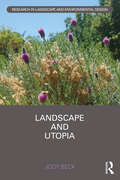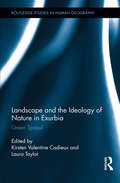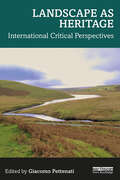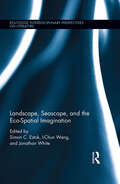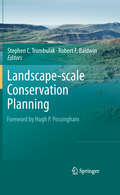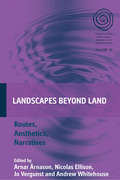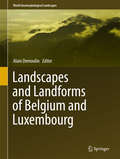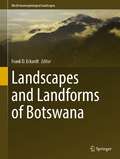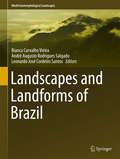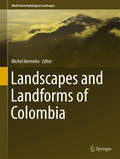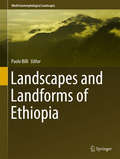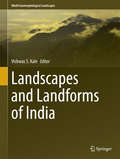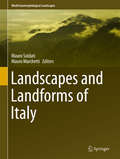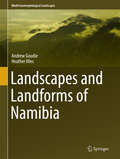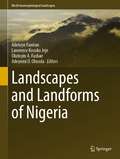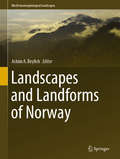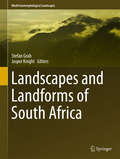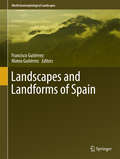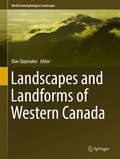- Table View
- List View
Landscape and Literature 1830–1914
by Roger EbbatsonThis study examines the vital centrality of 'readings' of nature in a variety of literary forms in the period 1830-1914. It is exploratory and original in approach, stressing the philosophical and cultural implications in a range of texts from Tennyson, Hardy, Jefferies and Thomas.
Landscape and Nature in Scandinavian Art (Routledge Research in Art History)
by MaryClaire PappasThis edited volume foregrounds new and vital scholarship shaping Scandinavian art historical research on the representations of the natural world.Contributors deconstruct the interlinking of people and land through critical readings of the Scandinavian representation of nature, bringing to the fore how the traditional focus on the landscape as a manifestation of temperament has tended to obfuscate critical approaches to the representation of the landscape. Making interdisciplinary connections, this volume redresses the imbalance in scholarship on the region that often emphasizes teleological national narratives and instead situates encounters with nature and the landscape in relationship to more interdisciplinary perspectives. Each chapter serves as a specific case study on topics ranging from circumpolar exploration and colonial practices, deconstructing National Romanticism myths, and contemporary artistic responses to the history of the politics of land.The book will be of interest to scholars working in art history, visual culture, nature studies, and environmental history.
Landscape and Utopia (Routledge Research in Landscape and Environmental Design)
by Jody BeckThis book examines three landmark utopian visions central to 20th century landscape architectural, planning, and architectural theory. The period between the 1890s and the 1940s was a fertile time for utopian thinking. Significant geographic shifts of large populations; radically altered relations between capital and labor; rapid technological developments; large investments in transportation and energy infrastructure; and repetitive economic disruptions motivated many individuals to wholly reimagine society – including the connections between social relations and the built environment. Landscape and Utopia examines the role of landscapes in the political imaginations of the Garden City, the Radiant City, and Broadacre City. Each project uses landscapes to propose a reconstruction of the relationships between land, labor, and capital but - while the projects are well-known – the role played by landscapes has been largely left unexamined. Similarly, the radical anti-capitalism that underpinned each project has similarly been, for the most part, left out of contemporary discussions. This book sets these projects within a historical and philosophical context and opens a discussion on the role of landscapes in society today. This book will be a must-read for instructors, students, and researchers of the history and theory of landscape architecture, planning, and architecture as well as utopian studies, cultural and social history, and environmental theory.
Landscape and the Ideology of Nature in Exurbia: Green Sprawl (Routledge Studies in Human Geography #39)
by Laura Taylor Kirsten Valentine CadieuxThis book explores the role of the ideology of nature in producing urban and exurban sprawl. It examines the ironies of residential development on the metropolitan fringe, where the search for “nature” brings residents deeper into the world from which they are imagining their escape—of Federal Express, technologically mediated communications, global supply chains, and the anonymity of the global marketplace—and where many of the central features of exurbia—very low-density residential land use, monster homes, and conversion of forested or rural land for housing—contribute to the very problems that the social and environmental aesthetic of exurbia attempts to avoid. The volume shows how this contradiction—to live in the green landscape, and to protect the green landscape from urbanization—gets caught up and represented in the ideology of nature, and how this ideology, in turn, constitutes and is constituted by the landscapes being urbanized.
Landscape and the Spaces of Metaphor in Ancient Literary Theory and Criticism
by Nancy WormanThis study explores a previously uncharted area of ancient literary theory and criticism: the ancient landscapes (such as the Ilissus river in Athens and Mount Helicon) that generate metaphors for distinguishing styles, which dovetail with ancient conceptions of metaphor as itself spatial and mobile. Ancient writers most often coordinate stylistic features with country settings, where authoritative performers such as Muses, poets, and eventually critics or theorists view, appropriate, and emulate their bounties (for example springs, flowers, rivers, paths). These spaces of metaphor and their elaborations provide poets and critics with a vivid means of distinguishing among styles and an influential vocabulary. Together these figurative terrains shape critical and theoretical discussions in Greece and beyond. Since this discourse has a remarkably wide reach, the book is broad in scope, ranging from archaic Greek poetry through Roman oratory and 'Longinus' to the reception of critical imagery in Proust and Derrida.
Landscape as Heritage: International Critical Perspectives
by Giacomo PettenatiThis edited book provides a broad collection of current critical reflections on heritage-making processes involving landscapes, positioning itself at the intersection of landscape and heritage studies. Featuring an international range of contributions from researchers, academics, activists, and professionals, the book aims to bridge the gap between research and practice and to nourish an interdisciplinary debate spanning the fields of geography, anthropology, landscape and heritage studies, planning, conservation, and ecology. It provokes critical enquiry about the challenges between heritage-making processes and global issues, such as sustainability, economic inequalities, social cohesion, and conflict, involving voices and perspectives from different regions of the world. Case studies in Italy, Portugal, Spain, Slovenia, the Netherlands, Turkey, the UK, Columbia, Brazil, New Zealand, and Afghanistan highlight different approaches, values, and models of governance. This interdisciplinary book will appeal to researchers, academics, practitioners, and every landscape citizen interested in heritage studies, cultural landscapes, conservation, geography, and planning.
Landscape with Figures: Selected Prose Writings
by Richard JefferiesRichard Jefferies was the most imaginative and least conventional of nineteenth-century observers of the natural world. Trekking across the English countryside, he recorded his responses to everything from the texture of an owl's feather and 'noises in the air' to the grinding hardship of rural labour. This superb selection of his essays and articles shows a writer who is brimming with intense feeling, acutely aware of the land and those who work on it, and often ambivalent about the countryside. Who does it belong to? Is it a place, an experience or a way of life? In these passionate and idiosyncratic writings, almost all our current ideas and concerns about rural life can be found.Richard Jefferies (1848-1887) was the son of a Wiltshire farmer. He never worked the land but made his living from writing, trekking across the countryside with his notebook. He spent much of his life struggling against poverty and tuberculosis, which would eventually kill him at the age of thirty-nine. As well as being in many ways the father of English nature writing, Jefferies also wrote the classic children's book Bevis and the apocalyptic science-fiction novel After London.Richard Mabey's introduction to his selection of Jefferies' work discusses the author's life, his views on the paradoxes of rural life and his place in the tradition of nature writers.
Landscape, Seascape, and the Eco-Spatial Imagination (Routledge Interdisciplinary Perspectives on Literature)
by Jonathan White Simon C. Estok I-Chun WangWritten from within the best traditions of ecocritical thought, this book provides a wide-ranging account of the spatial imagination of landscape and seascape in literary and cultural contexts from many regions of the world. It brings together essays by authors writing from within diverse cultural traditions, across historical periods from ancient Egypt to the postcolonial and postmodern present, and touches on an array of divergent theoretical interventions. The volume investigates how our spatial imaginations become "wired," looking at questions about mediation and exploring how various traditions compete for prominence in our spatial imagination. In what ways is personal experience inflected by prevailing cultural traditions of representation and interpretation? Can an individual maintain a unique and distinctive spatial imagination in the face of dominant trends in perception and interpretation? What are the environmental implications of how we see landscape? The book reviews how landscape is at once conceptual and perceptual, illuminating several important themes including the temporality of space, the mediations of place that form the response of an observer of a landscape, and the development of response in any single life from early, partial thoughts to more considered ideas in maturity. Chapters provide suggestive and culturally nuanced propositions from varying points of view on ancient and modern landscapes and seascapes and on how individuals or societies have arranged, conceptualized, or imagined circumambient space. Opening up issues of landscape, seascape, and spatiality, this volume commences a wide-ranging critical discussion that includes various approaches to literature, history and cultural studies. Bringing together research from diverse areas such as ecocriticism, landscape theory, colonial and postcolonial theory, hybridization theory, and East Asian Studies to provide a historicized and global account of our ecospatial imaginations, this book will be useful for scholars of landscape ecology, ecocriticism, physical and social geography, postcolonialism and postcolonial ecologies, comparative literary studies, and East Asian Studies.
Landscape-scale Conservation Planning
by Robert Baldwin Stephen C. TrombulakThis book applies the latest thinking and techniques of systematic conservation planning to the issues that arise in protecting ecosystem pattern and process in human-dominated landscapes such as seascapes, multiple countries and conservation targets.
Landscapes Beyond Land: Routes, Aesthetics, Narratives
by Ellison Árnason Vergunst WhitehouseLand is embedded in a multitude of material and cultural contexts, through which the human experience of landscape emerges. Ethnographers, with their participative methodologies, long-term co-residence, and concern with the quotidian aspects of the places where they work, are well positioned to describe landscapes in this fullest of senses. The contributors explore how landscapes become known primarily through movement and journeying rather than stasis. Working across four continents, they explain how landscapes are constituted and recollected in the stories people tell of their journeys through them, and how, in turn, these stories are embedded in landscaped forms.
Landscapes and Landforms of Belgium and Luxembourg
by Alain DemoulinThis book provides an informative and intriguing overview of the most scenic landscapes of Belgium and Luxembourg. Geodiversity is emphasized, for example the periglacial features in the Hautes Fagnes area, the planation surfaces in the Ardennes and Oesling, and the famous caves of Han/Lesse and Remouchamps. The book's chief goals are to provide the reader with enjoyable and informative descriptions of the selected sites within their regional geographical and geological settings; to offer an up-to-date survey of the evolution of Belgium's and Luxembourg's landscape; and to share additional information on the cultural value of the respective sites wherever appropriate. The book is a richly illustrated reference work that makes accessible for the first time a wealth of information currently scattered among many national and regional journals. It will benefit earth scientists, environmental scientists, tourism geographers and conservationists alike.
Landscapes and Landforms of Botswana (World Geomorphological Landscapes)
by Frank D. EckardtThis volume contains 22 chapters introducing a wide range of semi-arid and geologic landscapes. Botswana, a thinly populated nation, the size of France, is a Southern African keystone country at the heart of the Kalahari, sharing some of the major sub-continental drainage basins such as the Limpopo, Zambezi, Orange, and Okavango with its neighbouring countries. The extensive Kalahari Sand surface has been sculptured by numerous past processes which have produced subtle but regional landforms consisting of extensive dunes and shorelines. Incipient rifting has created the dynamic Okavango and Makgadikgadi fan-basin systems which produces iconic wetlands with a world heritage status. Geological outcrops in particular to the east expose highly denuded basement lithologies which produces numerous inselbergs that are home to a rich archaeological heritage. The book also examines the geomorphology of mineral and water resources which sustain the economy and population and also features dedicated chapters that cover diamondiferous kimberlites, caves, pans, dams, duricrusts and wildlife.Chapter 6 is available open access under a Creative Commons Attribution 4.0 International License via link.springer.com.
Landscapes and Landforms of Brazil
by Bianca Carvalho Vieira André Augusto Rodrigues Salgado Leonardo José Cordeiro SantosThis book presents Brazil as a country of continental dimensions. Its territory has a large variety of rock types, geological structures and climates. The country has a large variety of landscapes, such as the humid plains of the Amazon River, the dry plateaus of the semi-arid region or the subtropical mountains of the southern region. On the coast, some plateaus and mountains, like the Serra do Mar Mountain range, formed a significant barrier front to access the hinterland of Brazil. On the other side of these coastal plateaus and mountains, there is a large collection of other plateaus, mountains, plains and depressions little altered by human interference. Thus, Brazil has a unique variety of different landscapes and extraordinary geomorphological sites. The book invites readers to learn more about the beautiful Brazilian landscapes, their complexity and vastness.
Landscapes and Landforms of Colombia
by Michel HermelinThis book provides an attractive and informative overview of Colombian landscapes and their geological evolution, including comprehensive descriptions of seventeen key selected sites in the country. It provides insight into the geomorphological diversity of Colombian landscapes characterized by climatic and topographic variation. The book covers the essence of the landscapes in the country: coastal features, mud volcanoes, desertic geoforms, snow covered peaks, active volcanoes, deeply incised canyons and subdesertic valleys. It contributes knowledge and understanding into Colombian landscapes and prospects.
Landscapes and Landforms of Ethiopia
by Paolo BilliThis book provides a succinct but comprehensive presentation of key geomorphological locations and topics including information about geomorphological heritage and maps to visit the most important sites. Apart from often being remarkably scenic, landscapes reveal stories that often can be traced back in time tens of million years and include unique events. This is particularly true for Ethiopia where spectacular examples of different landforms are present. Its geomorphology varies from highlands, marked by high volcanoes and incised by deep river gorges, to the rift valley lakes endorheic systems and the below sea level lowlands with characteristic landscapes which are unique in the world. Landscapes and Landforms of Ethiopia highlights all these topics including essential information about geology and tectonic framework, past and present climate, hydrology, geographical regions and long-term geomorphological history. It is a highly informative book, providing insight for readers with an interest in geography and geomorphology.
Landscapes and Landforms of France
by Marie-Françoise André Monique FortThe Landforms and Landscapes of France provides an informative and attractive overview of the most scenic landscapes of France. The geodiversity of France is emphasized, for example the glacial landscapes of the Mont-Blanc Massif, the volcanoes of the French Massif Central, the chalk cliffs and sand dunes of the Atlantic coast, the granitic landscapes of Corsica or the lagoons and coral reefs of French Polynesia. The objectives are to provide the reader with an enjoyable and informative description of the selected sites within their regional geographical and geological settings; to offer an up-to-date survey of the evolution of France's landscape; and to give additional information on the cultural value of the selected sites wherever appropriate (prehistoric paintings, legends related to sites, famous vineyards, etc.). The book is a richly illustrated reference work that makes accessible for the first time a wealth of information currently scattered among many national and regional journals. It will be of benefit to earth scientists, environmental scientists, tourism geographers and conservationists
Landscapes and Landforms of India
by Vishwas S. KaleThe proposed monograph on 'Geomorphological Landscapes of India' will aim to describe and explain in simple words the geomorphological characteristics and the origin of the above-mentioned landforms and landscapes. The proposed monograph will provide the background information about the geology, climate and tectonic framework of the Indian region, as well as cover Indian climates of the present and the past. It will mainly cover the four main morphotectonic regions of India and about 15-20 distinct landforms of the Indian region as well as the major geomorphosites in India.
Landscapes and Landforms of Italy
by Mauro Soldati Mauro MarchettiThe book deals with the most striking landscapes and landforms of Italy. Attention is given to landform diversity and landscape evolution through time which has been controlled by very diverse geological conditions and dramatic climate changes that have characterized the Italian peninsula and islands since the end of the last glaciation. In addition, various examples of human impact on the landscape are presented. Landscapes and Landforms of Italy contains more than thirty case studies of a multitude of Italian geographical landmarks. The topics and sites described in this book range from the Alpine glaciers to the Etna and Vesuvius volcanoes, taking into account the most representative fluvial, coastal, gravity-induced, karst and structural landscapes of the country. Chapters on the geomorphological landmarks of the cities of Rome and Venice are also included. The book provides the readers with the opportunity to explore the variety of Italian landscapes and landforms through informative texts illustrated with several color maps and photos. This book will be relevant to scientists, scholars and any readers interested in geology, physical geography, geomorphology, landscape tourism, geoheritage and environmental protection.
Landscapes and Landforms of Namibia
by Andrew Goudie Heather VilesThe landscapes of Namibia are of world-class quality in beauty, diversity and interest. This book provides the first ever overview of the most important of these landscapes, explains why they look as they do, and evaluates why they are of note. Writing from a geomorphological perspective, the authors introduce the key processes and controls which influence landscape and landform development in Namibia. Geological and tectonic background, climate now and in the past, vegetation and animals (including humans) are all identified as crucial factors influencing the landscape of Namibia today. The book presents twenty one richly-illustrated case studies of the most significant landscapes of Namibia, ranging from the iconic Etosha Pan at the heart of the biggest wildlife conservation area in the north, to the famous dunes and ephemeral river at Sossus Vlei in the heart of the Namib desert. Each case study also contains a full list of the key references to the scientific work on that landscape. The authors provide an assessment of the current state of conservation of these landscapes, and their importance to tourism. The book is recommended reading for anyone with a professional or amateur interest in the spectacular and intriguing landscapes of this part of southern Africa. It provides a useful handbook for those travelling around Namibia, and an invaluable reference guide for those interested in how landscapes develop and change.
Landscapes and Landforms of Nigeria (World Geomorphological Landscapes)
by Adetoye Faniran Lawrence Kosoko Jeje Olutoyin A. Fashae Adeyemi O. OlusolaThe book deals with the most striking landscapes and landforms of Nigeria. Attention is paid to the diversity of geomorphic features found in the country, from the coast to the extreme north, approached geographically at the national, regional and local scales, with a view to highlight the combined influence of geological, climatic, biotic and anthropogenic influences, as well as geoheritage potentials. The topics and sites described range from the mainly depositional coastal lagoons and inlets, the most prominent of which is the oil rich Niger Delta, characterized by the mangrove and rain forest, both of which have been seriously modified by human impact; through the coastal lowlands and associated hill country, with derived, deciduous and dry forest vegetation; the very prominent Niger/Benue Trough and associated features; the savanna-semi desert covered high plains of the north and the Chad Basin, each of which features spectacular landscapes and landforms, including human-made forms such as cities and cityscapes. The book provides the readers with the opportunity to explore the variety of Nigerian landscapes and landforms through informative texts illustrated with color maps and photos: it will be relevant to scientists/scholars as well as others interested in the geology, physical geography, geomorphology, landscape, tourism and other geoheritage-related information about the country.
Landscapes and Landforms of Norway (World Geomorphological Landscapes)
by Achim A. BeylichThis book discusses the striking geomorphological landscapes of mainland Norway. As part of the Springer book series on World Geomorphological Landscapes, it outlines the nature and diversity of Norway's geomorphological landscapes and examines the geological background and the drivers of landscape evolution. It also features numerous case studies describing the most striking sites, and offers insights into the status and value of geoheritage and geoconservation in the country.Providing readers with an opportunity to explore the variety of Norwegian landscapes and landforms through informative texts richly illustrated with color maps and photos, the book will appeal to scientists, scholars and any readers interested in geology, physical geography, geomorphology, landscape tourism, geoheritage and environmental protection.
Landscapes and Landforms of Slovakia (World Geomorphological Landscapes)
by Milan Lehotský Martin BoltižiarLandscapes and Landforms of the Slovakia provides an attractive physiographical overview of the most prominent landscapes of Slovakia and the distinctive landforms associated with them. It describes the main driving factors leading to their evolution and importance for geoconservation and geotourism.The richly illustrated book provides the reader with enjoyable and informative descriptions of the selected sites within their regional geographical and geological settings range from the Tatras Mts. with glacially shaped relief as the highest region in the Carpahians to caves and lowlands taking into account fluvial, gravity-induced, karst and structural landscapes of the Slovakia.The book is organized in 3 parts: a) Introduction, which presents a general framework of the physical geography of Slovakia, b) Geomorphological landscapes, presenting papers dealing with key geomorphological areas, resp. landforms, c) Geoheritage and landscape protection, providing an updated vision on the geomorphological/geological heritage sites and landscape protection policy in Slovakia.The book will be relevant to scientists, scholars and any readers interested in geomorphology, geology, physical geography, geoheritage, landscape tourism and environmental protection. It can be also used for undergraduate and graduate courses in Earth and environmental sciences.
Landscapes and Landforms of South Africa
by Jasper Knight Stefan GrabThis book presents a beautifully illustrated overview of the most prominent landscapes of South Africa and the distinctive landforms associated with them. It describes the processes, origins and the environmental significance of those landscapes, including their relationships to human activity of the past and present. The sites described in this book include, amongst others, the Blyde River Canyon, Augrabies Falls, Kruger National Park, Kalahari desert landscapes, the Great Escarpment, Sterkfontein caves and karst system, Table Mountain, Cape winelands, coastal dunes, rocky coasts, Boer War battlefield sites, and Vredefort impact structure. Landscapes and Landforms of South Africa provides a new perspective on South Africa's scenic landscapes by considering their diversity, long and short term histories, and importance for geoconservation and geotourism. This book will be relevant to those interested in the geology, physical geography and history of South Africa, climate change and landscape tourism.
Landscapes and Landforms of Spain
by Francisco Gutiérrez Mateo GutiérrezThe Landscapes and Landforms of Spain provides an informative and inviting overview of the geology and geomorphology of Spain. It incorporates a diverse range of topics, ranging from the fiery landscapes of the Canary Islands and its volcanic formations to the glacial scenery of the Pyrenees. The book devotes attention to granite landforms, karst terrains, coastal dunes and marshes, as well as to heritage and conservation, with the objective of offering the reader a comprehensive insight into the Spanish geological setting. The book presents readers with the opportunity to explore Spanish landforms in detail through its highly illustrated pages and maps, making this an appealing text on the subject field.
Landscapes and Landforms of Western Canada
by Olav SlaymakerThis is the only book to focus on the geomorphological landscapes of Canada West. It outlines the little-appreciated diversity of Canada's landscapes, and the nature of the geomorphological landscape, which deserves wider publicity. Three of the most important geomorphological facts related to Canada are that 90% of its total area emerged from ice-sheet cover relatively recently, from a geological perspective; permafrost underlies 50% of its landmass and the country enjoys the benefits of having three oceans as its borders: the Arctic, Pacific and Atlantic oceans. Canada West is a land of extreme contrasts -- from the rugged Cordillera to the wide open spaces of the Prairies; from the humid west-coast forests to the semi-desert in the interior of British Columbia and from the vast Mackenzie river system of the to small, steep, cascading streams on Vancouver Island. The thickest Canadian permafrost is found in the Yukon and extensive areas of the Cordillera are underlain by sporadic permafrost side-by-side with the never-glaciated plateaus of the Yukon. One of the curiosities of Canada West is the presence of volcanic landforms, extruded through the ice cover of the late Pleistocene and Holocene epochs, which have also left a strong imprint on the landscape. The Mackenzie and Fraser deltas provide the contrast of large river deltas, debouching respectively into the Arctic and Pacific oceans.


